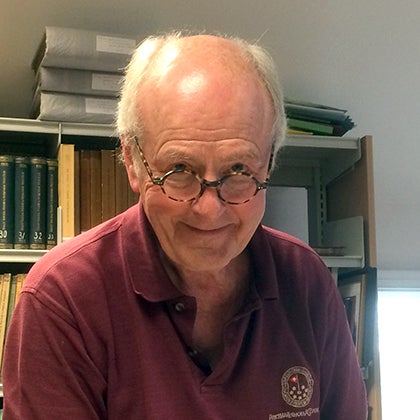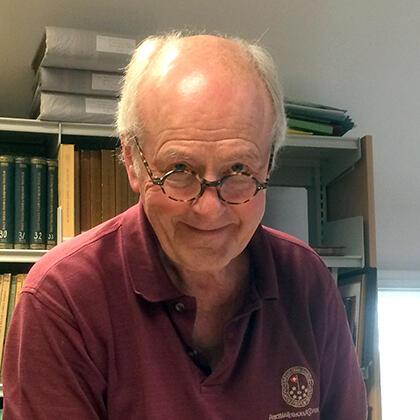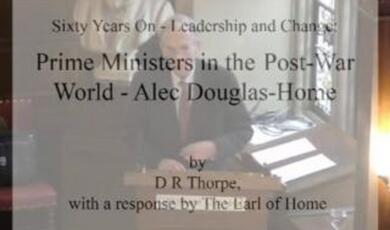The Lord Mayor of London: Reflections on a medieval role in the modern City
Share
- Details
- Transcript
- Audio
- Downloads
- Extra Reading
The position of the Lord Mayor of London has existed since 1189 and has always been one of the most important roles in maintaining London as the prime international financial capital in the world.
As the 679th Lord Mayor, John Stuttard attended nearly 2,000 engagements, including 466 formal lunches and dinners, 764 speeches and 133 media interviews. He hosted visiting foreign Ministers, businessmen and dignitaries and he spent more than 100 nights abroad in 23 countries promoting the financial, maritime and other business services industry of the UK. Every day was different; every day was special.
This talk looks at the reasons behind the City of London becoming the Financial Centre of the World, what the key success factors, opportunities and threats are, and what the role of the Lord Mayor is as the champion of the City both ancient and modern.
Download Transcript
Lord Mayor of London:
Reflections on a Medieval Role in the Modern City
Sir John Stuttard, Vice Chairman PwC Advisory Board
Over the centuries, Lord Mayors have always taken an interest in good governance and in the rule of law.
Some 800 years ago - Monday the 15th of June 1215 to be precise - it was a warm summer's day. The Mayor of London, William Hardel, had left the capital and was enjoying the fresh country air in a field beside the River Thames, full of ragged robin, cow parsley and forget-me-nots. Together with archbishops, earls and barons, he was present at an event that has influenced governance and the rule of law over centuries. He was, as you may have guessed, one of those present at Runnymede who witnessed the signing by King John of the Magna Carta, the Great Charter.
Remembered, centuries later, as the document that enshrined the right of habeas corpus, it actually did much more than that. It reintroduced an earlier Saxon concept that the Law was a power in its own right, to which the King was also subject. In its 63 clauses, the Magna Carta limited the King's powers and reasserted feudal rights and customs. It stated that no taxes could be demanded without the 'general consent of the Realm'.
It introduced a balance of power between Monarch and Ruled, something which has existed, more or less, ever since in Great Britain and its colonies. It introduced a concept that we now know in the City as 'Corporate Governance' where there are checks and balances over the executive.
Such thoughts did not, of course, begin with the Magna Carta. In his book,Laws, written around 360BC, Plato expressed doubts about whether any man in supreme power can avoid misusing it. Plato wrote that a man in such a position 'inevitably loses his wisdom and integrity' - and that 'checks are needed to prevent misuse of power'.
Fast forward again to the 12th century when King John's father, Henry II, uttered those fateful words which have been immortalised in the rhetorical question 'Will no-one rid me of this turbulent priest'. But Henry is also well known for his contribution to the rule of law. He established permanent professional Courts at Westminster and laid the foundations of a system of justice, which we know today as English Common Law. Taken by the British to possessions around the world, this unique legal framework is now the basis of commercial law in cities such as New York, Singapore and Hong Kong, which along with London, are the four most important financial centres in the world. Perhaps it's no accident that Common Law prevails in these key centres, since it is practical, flexible and understandable. Interestingly it has also been adopted in both Dubai and Qatar, which aspire to be financial centres.
And here is a word of warning for Europhiles. Don't allow something which has taken centuries to develop and which is a key success factor of the City of London to be eroded by a legalistic regime emanating from Brussels or Strasbourg. I should add that I am pro the EU and I am very pro Free Trade. But I am absolutely opposed to jeopardising something so precious and to harming this country's competitiveness.
William Hardel was only the fourth Mayor of London - an office which was created in 1189 and of which I was the 679th incumbent. Each November, after being admitted to Office, the new Lord Mayor journeys from the City to the Royal Courts of Justice. Here he swears an oath of allegiance to the Monarch, before the Lord Chief Justice and the Master of the Rolls. This ceremony is part of the well publicised Lord Mayor's Show which is a great spectacle and much loved - by young and old.
Thus the public perception of the Lord Mayor is of someone dressed in a scarlet gown travelling in a golden coach leaning out of the window waving a back tricorne hat with a black ostrich feather in it. Actually, the hat is quite heavy and, being three sided, it is quite difficult to hold. With the lingering effects of tennis elbow I was terrified of dropping the wretched thing and finding that one of the shire horses would tread on it. The Worshipful Company of Feltmakers, who had generously given me the hat, would not have been amused. But fortunately there was no mishap.
In the 12th century, when the Mayoralty began, the businesses of the City included bakers, bowyers, butchers, carpenters, fletchers, glaziers, ironmongers and salters. All were domestic in character. They were represented by livery companies who controlled their craft, offering apprenticeships and training and also ensuring the quality, as well as the price, of their products. The Lord Mayor could meet his constituents by lunching or dining with the livery companies in turn.
Today the businessmen of the City are accountants, bankers, fund managers, insurers, ship brokers, solicitors and stockbrokers - and these firms are international in character. In fact in London today, a large proportion of these businesses is owned by companies who are registered abroad.
Reflecting this enormous change in the composition of the City's businesses, the content of the Lord Mayor's role has had to change, as well as the requirements for the job. A 21st Century Lord Mayor represents, supports and promotes the UK financial services industry - all of it - wherever it is based: Canary Wharf, the West End, Edinburgh or Leeds; and whoever owns it: Citi, CSFB, Deutsche Bank Marsh, Societe Generale.
He represents the UK financial sector in discussions with the UK Government and the European Commission and he promotes it both at home and abroad. And the financial sector is hugely important to the economy, accounting for as much as 12% of GDP and far more than that when you consider the Multiplier Effect.
So, the Lord Mayor has to be au fait with such issues as the regulatory environment and non-domicile tax as well as with new, innovative products such as Carbon Emissions Credits, Islamic Finance and Forward Freight Derivatives. During the year he meets dozens of Finance Ministers, Governors of Central Banks and Chairmen of Regulatory Authorities both at Mansion House, where I received over 100 Ministers and senior officials - about two a week - and abroad. In fact I spent 106 nights outside the UK visiting no fewer than 23 countries.
Nowadays the Lord Mayor typically dresses in a lounge suit - for business meetings - although from time to time, he or she dons 18th century costume, fulfilling a traditional as well as a modern role. It is easy to cast aside tradition and, often with it, the values which are crucial to London's success. Once gone, customs are difficult to re-introduce. Once eroded, values are difficult to get back.
The main role of representing and promoting the financial sector is complemented by other responsibilities. The Lord Mayor is head of the City of London Corporation, the organisation which looks after the Square Mile, with powers similar to those of a local authority, except it has its own Police Force and many charitable bodies that go back many hundreds of years.
He is the Chief Magistrate of the City, fulfilling a centuries old tradition of being the City's most senior legal officer. To give substance to this position, every quarter the Lord Mayor processes in State to the Central Criminal Court at Old Bailey to open the Courts and even to consider a case - these days nothing more onerous that a request for an adjournment.
He welcomes the Monarch when he or she visits the City. During my year, the Queen came twice - once to celebrate the 25th anniversary of the Barbican Centre and then again to commemorate the centenary of the Old Bailey.
He is also Admiral of the Port of London, although I never found a job description or the uniform. And when there is a State Visit to the UK, he presides over a grand banquet at Guildhall for the visiting Head of State. In my year, I welcomed the President of Ghana and the King of Saudi Arabia for State Banquets.
But, the main role is promoting the City.
I was delighted, therefore, during my year as Lord Mayor, to learn that London was confirmed as the world's prime international financial centre. I wanted to learn more about the key success factors and Michael Mainelli, one of your professors here at Gresham College, has done some sterling work on the subject, jointly with the City of London Corporation. Each month, his Z/Yen group produce a report updating the Global Financial Centres Index.
It has been said by many that our time zone helps, but then this factor should equally well have helped Frankfurt and Paris who are no longer major international financial centres. In the Far East, it should also have helped Tokyo and Seoul, each of which has now been eclipsed as international financial centres by Singapore and Hong Kong.
It has been suggested that the fact we speak English has helped - and this is certainly true. The first four centres in the league table of global financial centres also have English as their main language.
But there are other factors which are regarded as key to our success and I will briefly describe them, together with a commentary where I perceive them to be under threat.
First, as mentioned earlier, the UK has a culture and system of values and laws that are conducive to the success of a financial services industry. These include an appreciation of integrity and fairness, as well as equity, tort, contract, confidentiality and professionalism, where 'one's word is one's bond', where you can sue for specific performance or damages, and where courts are independent and fair. These essential cultural and legal attributes are often either overlooked or minimised in importance. We tend to take them for granted. I was delighted, therefore, to have the opportunity of hosting a reception for the Lord Chancellor and the Lord Chief Justice when they announced the decision to build a new Commercial Court in the City - something which successive Lord Mayors had been advocating for years.
Then, London is a completely open and free market place, as a result of something known as 'Big Bang'. In 1986, inspired by Margaret Thatcher, the UK Government removed all restrictive practices and barriers to entry in the UK's Financial Sector. The result was immediate and outstanding. The openness and lack of protectionism inspired foreign financial institutions, from the US, Germany, Switzerland and elsewhere, to increase the size and scope of their operations in London. Many aspiring financial centres are still protectionist in nature and have many restrictive practices preventing free market entry.
A third key success factor is the large pool of professional talent in London. The UK financial services sector is very large, employing over one million people. Many of our brightest graduates go into financial services. But we also attract very many foreign nationals - young people who come to London to study and to learn the business - and not so young people who come to run foreign branches. They contribute greatly to our success and it is important that they are not denied this opportunity through protectionist concerns over our domestic labour market. Typically, foreign workers in this industry come for short periods - just a few years - and when they go home, they are great ambassadors for the UK. With a bit of luck they are friends for life.
The importance of having a large pool of skilled professionals, including young people from abroad, prompted me to launch a promotional campaign during my Mayoralty. With the catchy title 'City of London - City of Learning', the aim of the campaign was to promote the UK as the place for youngsters to come to for a business education and a professional training. A campaign team was assembled, led by an energetic chairman, Sir Paul Judge, who has a longstanding interest in business education. The team also included experienced educationalists such as your own Provost at Gresham College, Sir Roderick Floud, who was then head of London Metropolitan University, together with David Rhind, then Vice-Chancellor of City University and Gordon Slaven from the British Council. Launched by the Economic Secretary to the Treasury, Ed Balls MP, we gave more than 30 seminars in over 20 countries. We had help from UKTI and IFSL, as well as the British Council, who administered the seminars. We also had significant involvement from leading professional organisations such as ACCA, CII and the Cass Business School.
The UK has indeed today become a centre of business and professional learning, as well as the world's leading international financial centre; and these strengths are mutually supportive.
Allied to this is the role that the Lord Mayor plays in supporting charities and in raising funds for the annual Lord Mayor's Appeal. For my year, I chose to raise money in support of cross-border learning, under the banner 'Sharing Skills - Changing Lives'. Managed by Voluntary Service Overseas, who were the main beneficiary, over £2million was raised in a programme chaired by Sir Paul Judge.
Returning to the City's key success factors, the physical environment in London is conducive to agreeable living. Notwithstanding our own views about our public transport and traffic, London is actually a very attractive city, with plenty of cultural and other social amenities. Executives with young families find it easy to live in London - and their wives or partners also like it. Foreigners are, generally speaking, welcomed and they feel comfortable here in London. But clearly we have to do more to improve our infrastructure and the decision to go ahead with Crossrail was a necessary and a sound decision.
Having a benign fiscal environment is also important to our competitiveness. Of course, there will always be jurisdictions such as Bermuda and Ireland that attract companies, at the margin. But, in recent years, things have not been going in the right direction. The biggest concern is the attitude of our tax authorities. Since their merger, HMR&C have become more aggressive, confusing tax avoidance with tax evasion. Then, our real rate of tax has been increasing and will no doubt increase still further as we fund consumption to claw our way out of economic recession.
I have left to the end the one feature that up till now has been regarded as our unique selling proposition - the financial regulatory environment and our system of corporate governance.
The 'light touch' regulatory regime, as some have described it, was perceived, until recently, to be part of London's success. It is now perceived to have failed. But the situation is more complex than this. Certainly, there was a gap in terms of oversight of systemic risk in the financial sector. No-one was watching the fire in the kitchen as ever more innovative cooks created even more exotic dishes. Certainly, by its own admission, the Financial Services Authority was not as 'hands on' as it should have been when regulating individual companies. But, out of disaster comes leadership, as evidenced by Lord Adair in his recent pronouncements. The UK is still regarded as being at the forefront of financial regulation and it is important that we don't allow the rules-based, prescriptive, approach found in certain Continental jurisdictions to be adopted by default in the UK, or worse still in Europe, and globally. There is a need for intervention by regulators, where appropriate, and there is a need for a greater focus on risk. But we need better and not more regulation and we don't need a rule book.
Our Combined Code on Corporate Governance shines out as a model to be followed, drawing as it does on our history and our values. The separation of powers between Chief Executive and Independent Chairman and NEDs, reflects the basic tenets of the Magna Carta. This is pure Plato. But there is a need to build on this highly regarded framework in order to ensure that Non-Executive Directors are even more effective. In conclusion, a few thoughts:
• Ensure that Chairmen are truly independent of the executive decision-making by ensuring that there is a clear separation of roles and responsibilities. The Chairman, together with the other NEDs, should be responsible for, and confine himself or herself to chairing the board, appointing the CEO and the CFO, agreeing the strategy, approving acquisitions and ensuring that risks are managed and that financial information is produced promptly and accurately. The CEO should develop strategic options, appoint his team and manage the business, including the risks
• Ensure that the Chief Financial Officer is more independent by arranging for the CFO to report jointly to the independent Chairman and to the CEO
• Arrange for the NEDs to receive independent advice from someone in the company
• Encourage NEDs to commission their own external appraisals of potential acquisitions above a certain percentage of net assets or market capitalisation. Such appraisals will comment on strategic fit, likely benefits and risks as well as price. We know from experience that the success rate of acquisitions is typically very low. Acquisitions can, and do, ruin companies
• Ensure that NEDs do not take on too many directorships, are properly paid and spend more time understanding the business and its risks.
Our journey from Plato in the 4th century BC, to the Magna Carta in the 13th century AD, to today has been a long one. We are still not yet quite there. In the area of Corporate Governance there is still more to do.
But we are approaching this in the right way, taking it seriously and, in our usual English fashion, finding fault with our own performance. It is this approach, redolent of integrity, that has served us well. Despite our shortcomings and despite our self-criticism, it is noteworthy that the City of London is still regarded as the world's prime international financial centre. We must have got some things right, but we can't be too complacent. Now is the right time to consider further changes in our much-admired system of corporate governance.
© Sir John Stuttard, 14th May 2009
This event was on Thu, 14 May 2009
Support Gresham
Gresham College has offered an outstanding education to the public free of charge for over 400 years. Today, Gresham plays an important role in fostering a love of learning and a greater understanding of ourselves and the world around us. Your donation will help to widen our reach and to broaden our audience, allowing more people to benefit from a high-quality education from some of the brightest minds.


 Login
Login







